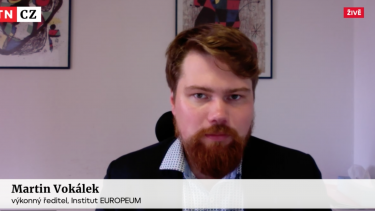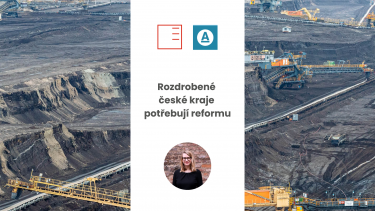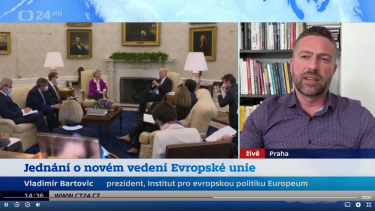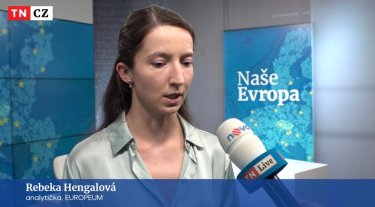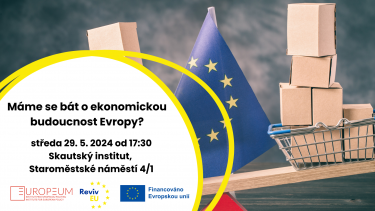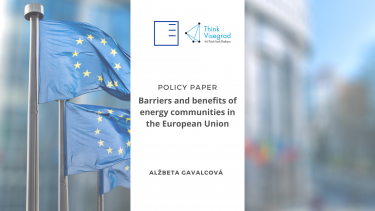TN Live | EU has approved further sanctions. They target the Russian industry and energy sector
European Union has approved its fourteenth package of sanctions against Russia, specifically targeting 116 additional individuals. Whom will the new package of sanctions affect the most? How effective have previous packages been so far? Martin Vokálek, Executive Director of EUROPEUM Institute, answered these questions live for TN Live.
Zjistit více
Aktuálně.cz | Fragmented Czech Regions Need Reform
In the autumn, regional council elections will be held. The existence of 14 regions in the Czech Republic, however, does not have a long tradition – they were only established in 2000, partly due to the anticipated entry into the European Union. This arrangement is now heavily criticized for their fragmentation, low and duplicative administrative capacities, and the associated negative impacts on the state budget. Klára Votavová, a researcher at EUROPEUM Institute, presents in her commentary on research on the capacities of the state and regions to draw from the Just Transition Fund, using the examples of the Karlovy Vary and Moravian-Silesian regions.
Zjistit víceČT24 | Negotiations on the new leadership of the European Union
Negotiations on the EU leadership positions will continue next week. On Thursday, leaders and presidents are due to make their final decision at a summit in Brussels. Vladimír Bartovic, President of EUROPEUM Institute, commented on whether Ursula von der Leyen will defend her post as President of the European Commission.
Zjistit víceTV Nova | Development of renewable energy sources
How does the Czech public view climate change and the development of renewable energy sources? Do they see it as a path to competitiveness? According to Czechs, should the European Union focus on environmental issues? Rebeka Hengalová, a research fellow at EUROPEUM Institute, discussed the STEM survey results in collaboration with the EUROPEUM Institute on the program "Naše Evropa" on TV Nova.
Zjistit víceRevivEU | Should we fear for the economic future of Europe?
We invite you to a public podcast recording focusing on the discussion of the impacts of the COVID-19 pandemic on European industrial policy and its potential consequences for the Czech economy and society. We will discuss the new technological dynamics resulting from the pandemic and explore ways in which the European Union can respond to technological competition with the USA and China.
Zjistit vícePolicy Paper | Barriers and benefits of energy communities in the European Union
Energy communities are an effective means to decentralize and renew our energy systems with sustainable solutions as they are usually based on renewable energy. They have already started emerging in 1970´s, yet there has been a significant increase in their development only in recent years, also in terms of their introduction into the EU legislation. Especially in Western and Northern European countries the concept already enjoys vast popularity. On the other hand, in Central and Eastern European countries (further referred to as CEE) energy communities are only beginning to emerge. The policy brief (based on literature and interviews with various stakeholders ) examines the benefits energy communities may bring, and more importantly, the main obstacles remaining in their way for greater evolution in the CEE region – and especially Visegrad countries (V4). As these initiatives progress, sharing the best practices will ensure the success of the community energy in the energy transition. Writes Alžbeta Gavalcová.
Zjistit vícePolicy Paper | Barriers and benefits of energy communities in the European Union
Energetické komunity jsou účinným prostředkem decentralizace a obnovy našich energetických systémů pomocí udržitelných řešení, protože jsou obvykle založeny na obnovitelné energii. Začaly se objevovat již v 70. letech 20. století, avšak k jejich výraznému rozvoji došlo až v posledních letech, a to i z hlediska jejich zavedení do legislativy EU. Zejména v zemích západní a severní Evropy se tato koncepce již těší velké oblibě. Naproti tomu v zemích střední a východní Evropy (dále jen SVE) se energetická společenství teprve začínají vytvářet. Tento politický brief (založený na literatuře a rozhovorech s různými zúčastněnými stranami ) zkoumá výhody, které mohou energetická společenství přinést, a především hlavní překážky, které jim stále stojí v cestě k většímu rozvoji v regionu střední a východní Evropy - a zejména v zemích Visegrádské skupiny (V4). Jak tyto iniciativy postupují, sdílení osvědčených postupů zajistí úspěch komunitní energetiky v energetickém přechodu. Píše Alžbeta Gavalcová.
Zjistit víceČRo Plus | The EU lags behind the US and China due to weak capital strength and new technologies
The European Union economically lags behind the United States of America and China. The recent meeting in Brussels reflected concerns about a slowdown in the EU economy, which entered 2024 with lower-than-expected growth. EUROPEUM Institute analyst Vít Havelka commented on this situation for ČRo Plus.
Zjistit více
RTVS | Extraordinary Summit in Brussels
The extraordinary summit in Brussels is focusing on competitiveness and the EU's strategic agenda, including the strengthening of the single market, Turkey-EU relations, Ukraine and Israel. Žiga Faktor, head of the Brussels office and deputy director of EUROPEUM Institute, commented on this for Slovak RTVS.
Zjistit více
iRozhlas.cz | Fossil fuel boilers are not banned by the European Union
The information about an EU-wide ban on gas and coal boilers, that has been recently circulating on social media, is not true. The aim of the new European directive is not to ban them, but to promote the phasing out of these boilers in line with the 2050 carbon neutrality targets. Viktor Daněk, deputy director of the EUROPEUM Institute, described the nature of the directive to the iROZHLAS.cz project Ověřovna.
Zjistit víceStaroměstské náměstí 4/1
Praha 1 - Staré Město
110 00
tel.: +420 212 246 552
email: europeum@europeum.org
https://www.europeum.org
